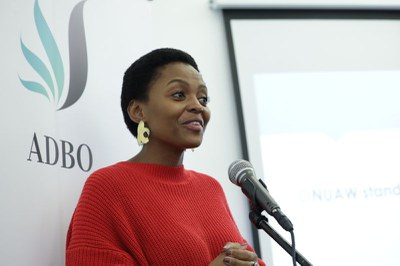Panelists included Gail Smith from the South African Human Rights Commission, Esinako Ndabeni, author of Born To Kwaito, Kerryane Burke from the African Diaspora Birthright Organisation, and Lebo Ramafoko, the Chief Executive Officer at the Soul City Institute for Social Justice.
Various speakers shared on how Mama Winnie Madikizela-Mandela’s legacy should be lived according to her values.
A granddaughter of Mandela family, Lindo Mandela, shared her experiences while growing up with the family and urged young women to challenge the status quo in society.
Smith illustrated how Winnie Madikizela-Mandela was an icon for black women’s struggle whilst Nelson Mandela was in prison.
“In retrospect, Madikizela-Mandela found herself in a patriarchal society which failed to protect her at difficult times in South Africa. Because the regime was always targeting her and whenever there was a court case and she turned up dressed well in a court case with a traditional Xhosa attire,” said Smith
Smith highlighted during the 1950’s there was an orchestrated campaigned to vilify black women who lived in the city as black women were not allowed to leave the city.
Smith said Madikizela-Mandela was the mother of the nation and she led the campaign to free black women in all spheres of the country through her feminist approach.
“The only Mandela I knew was Winnie as she gave expression to the meaning of women,” said Ramafoko.
“In my formative years as a black woman she was one of the women I looked up to with admiration. When I was at Wits University I had the privilege to see her and she was one person who represented a source of hope. We felt safe on campus as Mama Winnie was around. It pains me that men never stood up for Winnie Madikizela-Mandela when she was faced with difficult times.” said Ramafoko.
Ramafoko said young women should never be caught napping. “It is our duty to support the struggle of young women. Our job is to find expression of young women and use social media to connect with one another and help young women. Freedom was not free, and we would have failed Mama Winnie if we do not continue with the struggle”
Ndabeni, born in 1997, said: “There are many women in South Africa who built the country from its knees when men were in jail because of the struggle. The current struggle for young women is beyond marches and we need amplifying Mama Winnie Madikizela-Mandela’s legacy and we need to make sure that we continue the struggle.”
Burke said amplifying Mama Madikizela-Mandela was about how black women looked at themselves. “Women like Mama Madikizela-Mandela gave us strength and made it easy to challenge patriarchy.”
The event was concluded with a roundup of reflections from the young women, and a tour of the Constitutional Hill.

